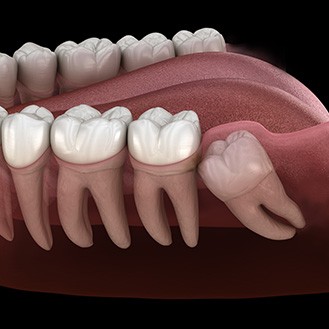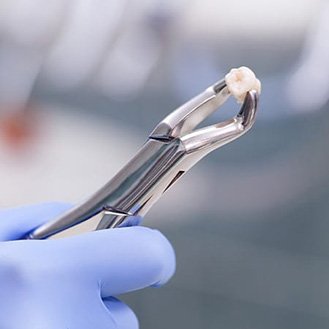Wisdom Tooth Extractions Mesquite
Gently Removing Teeth for Your Health

Unfortunately, not all teeth can be salvaged. Some are so badly decayed that root canal treatment will no longer work. Others dramatically increase the risk of serious oral health problems, like cysts and infections, which is often the case with wisdom teeth. If that’s the case, then Dr. Aldana or Dr. Vazquez need to remove your third set of molars to preserve the overall health and harmony of your smile. If you have questions or want to schedule an appointment, call our Soleil Dental Mesquite team so that we can start planning your wisdom tooth extractions in Mesquite with the utmost efficiency, gentleness, and care.
Why Choose Soleil Dental Mesquite for Wisdom Tooth Extractions?
- Down-to-Earth and Experienced Team
- Custom Treatment Plans
- Sedation Dentistry Available
What Are Wisdom Teeth?

In short, wisdom teeth are the third and final set of molars. Although most of your teeth are expected to last the rest of your life (provided you always take good care of them), wisdom teeth are by far the most likely to need to be removed. These teeth erupt relatively late, normally around the ages of 17 and 25; this means there’s often not enough space for them, and they might end up becoming painfully impacted. Fortunately, an extraction can help you prevent the long-term damage that wisdom teeth could potentially cause.
Why Do Wisdom Teeth Need to Be Removed?

Not all wisdom teeth need to be extracted. That said, if you don’t have enough room in your mouth or you’re at a high risk of developing an infection or complications by letting them grow in, your dentist in Mesquite will suggest having them removed in order to preserve your oral health. Some additional problems that can occur due to letting wisdom teeth grow in include:
- Cysts
- Gum infection
- Increased risk of cavities
- Crowding of teeth
What to Expect from the Wisdom Tooth Extraction Procedure

The process of removing your wisdom teeth will depend largely on one thing: whether they have broken through the gumline or they are trapped underneath. If they have broken through the gumline, then we will numb your mouth before gently rocking them loose and tending to the extraction site. If they are trapped underneath your gumline, then we will need to create an incision in your gums and remove the tooth section by section. Again, your mouth will be thoroughly numbed beforehand, so you won’t feel any pain during the extraction process.
Recovering from Wisdom Teeth Extraction

Each patient’s recovery process varies based on how many wisdom teeth were removed and whether they follow aftercare instructions properly. However, the average patient can expect to feel back to normal within one to two weeks. Here are some tips to make a speedy and pain-free recovery:
- Ice your jaw if you notice swelling or pain.
- Take all prescribed medications as directed.
- Avoid eating solid foods for as long as directed.
- Don’t drink from a straw.
- Quit smoking until you’ve completely healed.
Understanding the Cost of Wisdom Tooth Extractions

When you need a wisdom tooth extraction, you likely want it as soon as possible so you can relieve your discomfort. But maybe you’re feeling a tug from your wallet that’s making you hesitate. If that’s the case, we invite you to read the information below. There are many factors that can influence the cost of a wisdom tooth extraction; however, our team is dedicated to helping you get an idea of what to expect, as well as finding ways to make your treatment more affordable. It might not be as pricey as you think!
Factors That Can Impact the Cost of Wisdom Tooth Extractions

During your consultation, we’ll delve into the details of your unique case and provide you with a more precise cost estimate. Here’s some of the factors we’ll be looking at:
- The number of wisdom teeth you need extracted. While it’s fairly common to have to remove four wisdom teeth, this isn’t always necessary, and your treatment costs will reflect that.
- Whether your wisdom teeth are impacted or not. “Impaction” means that your teeth are trapped below or mostly below your gumline. Removing them tends to be more involved than wiggling free a fully-grown, fully emerged pearly white.
- The possibility of dental sedation. We offer dental sedation for anxious patients, but keep in mind that this cost would be added onto the anesthetic necessary for numbing your treatment area.
Does Dental Insurance Cover Wisdom Tooth Extractions?

Most dental insurance plans will cover at least part of the cost of a wisdom tooth extraction, but this isn’t necessarily a guarantee. We encourage patients to review their dental insurance benefits, along with their yearly deductible and annual maximum.
Don’t worry – we know dental insurance can be confusing! As an insurance-friendly dental practice, we’re very familiar with various different policies, including adult Medicaid. If you’d like help navigating your benefits and making sure you get the most out of your monthly premium, we’ll take a look at your plan and let you know what we find.
How to Make Wisdom Tooth Extractions More Affordable

If dental insurance isn’t an option, we have other ways of helping you make your wisdom tooth extraction more affordable. Our very own Sunshine Membership Plan, for example, will cover two exams and X-rays per year, and gets you 40% off of major treatments. CareCredit financing, on the other hand, would allow you to pay for your wisdom tooth extraction in smaller, monthly chunks.
Be sure to contact our office if you’re interested in either of these two payment options, or if you have any other financial questions or concerns. We’ll do our best to make the process as smooth as possible!
Wisdom Tooth Extractions FAQs
Why Do We Have Wisdom Teeth?
While wisdom teeth aren’t much use for us today, they were quite beneficial to early man. Because our ancestors used to eat a diet of mainly raw foods, including nuts, berries, leaves, roots, and raw meat, they put a lot of wear on their teeth. They didn’t use utensils or modern cooking methods, so chewing broke down their molars much faster than it does today. After they hit their late teens, they needed new teeth to keep eating, and wisdom teeth grew in to remedy the problem. They also had larger jaws, so when these teeth appeared, they could easily fit in their mouth.
Today, however, your jaw is much smaller, so when modern humans get their wisdom teeth, there’s frequently very little space left to accommodate them. Worse yet, because there is nowhere for them to go, they not only cause crowding, but they can also damage nearby teeth and cause excessive pain in the process.
Is Wisdom Tooth Removal Painful?
The first step in any wisdom tooth extraction procedure is always to numb your mouth with local anesthetic. You may also be sedated, which will limit your body’s ability to register pain. Thus, your treatment itself should be painless. You may still feel some slight pressure as your teeth are removed, but it should not hurt.
After your procedure, it is common to experience soreness and general discomfort, but as long as you follow your aftercare guidelines you should be feeling better in about a week.
What’s the Best Age to Get Wisdom Teeth Removed?
There is no specific age at which you should have your wisdom teeth removed; however, most dentists recommend extracting them in early adulthood or as soon as they come in if needed. They still can be removed later in life, but the procedure and recovery are both much easier when you are younger. This is because as you age, the roots of your teeth grow longer and become more embedded in your jaw. The deeper they are, the more complicated the procedure becomes, and thus the longer the healing process can take.
Furthermore, the procedure is often easier to schedule for younger patients, because it can often be booked around holiday breaks and long weekends during the school year.
If Dr. Vazquez or Dr. Saldana recommend wisdom tooth removal, it is better to do it sooner rather than later to avoid any painful risks like impaction, cysts, tooth decay, or damage to nearby healthy teeth.
Should Wisdom Teeth Be Removed If They Don’t Hurt?
Even if your wisdom teeth don’t hurt, they could become problematic in the future if they’re not removed. While some people’s wisdom teeth never create issues, in some cases leaving them intact can cause severe pain, infection, and other oral health problems.
Your wisdom teeth should only be removed if Dr. Saldana or Dr. Vazquez recommend it, as they are qualified to evaluate whether these molars currently pose any risks or may in the near future.
Once you have been recommended for extraction, you should schedule the procedure sooner than later, even if they aren’t causing any discomfort currently. This is because if left in place, they could contribute to many problems, including:
- Infection: Wisdom teeth can trap food debris and bacteria, and due to their hard-to-reach location, this can easily cause infection and decay, putting your other teeth and your gums at risk as well.
- Jaw Pain and headaches: Because your wisdom teeth often grow at odd angles, they can easily exert pressure onto your other teeth, causing jaw and head pain.
- Cysts: When you don’t remove your wisdom teeth soon enough, it could cause a fluid sac to develop around them, which may grow into a cyst that is capable of permanently damaging your surrounding teeth, gums, and jawbone.
- Orthodontic problems: When your wisdom teeth press against your other teeth, they could cause them to become misaligned. In severe cases, you may even need to get braces to correct this later on.
I Need a Checkup & Cleaning I Need a Dentist for My Child I am Concerned About Bleeding Gums I Have a Cavity or Broken Tooth I am Missing One or More Teeth I Want to Enhance My Smile I Want a Straighter Smile I am Scared of the Dentist I am In Pain & Need Help I Have Pain in My Jaw View Our Services
